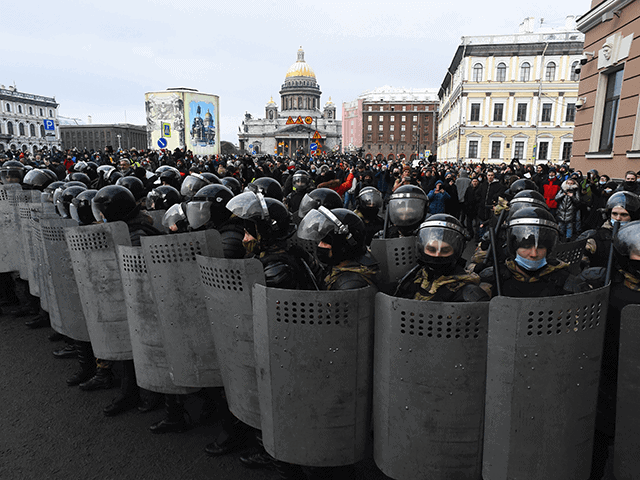Russian Police Detain Thousands in Second Week of Navalny Protests

Police in Russia detained thousands of protesters across the country on Sunday for participating in the second week of unauthorized rallies demanding the release of Kremlin critic Alexei Navalny from jail.
Authorities detained 5,646 people across more than 80 cities in Russia, including 1,861 in Moscow, on January 31, according to OVD-Info, which publishes lists of detainees by Russian police departments on days of political protests. Many of the protesters detained on Sunday “were released later in the day,” the New York Times reported on Monday.
“Moscow police had closed seven metro stations and limited pedestrian movement in the city center ahead of Sunday’s protest, an unprecedented move. The Moscow rally was due to take place outside the headquarters of the Federal Security Service (FSB) … before a last-minute change,” the Moscow Times reported.
Navalny’s team released a statement online Monday saying they expect Russian prosecutors to pursue riot charges, which carry long sentences, against protesters based on two incidents documented by Russian media on January 31. In the first incident, protesters allegedly set a Russian military police car on fire in Moscow, while in the second incident, a protester approached a line of riot police wielding a club.
“The Moscow police have opened a criminal case over the Rosgvardia [Russian National Guard] car burned down in Voznesensky Lane. It was set on fire,” Baza, an independent online news agency focused on investigations, reported.
Kremlin spokesman Dmitri Peskov told reporters via conference call on Monday that Sunday’s protests included “a large number of hooligans and provocateurs” who acted aggressively towards police and that “the law should be applied with the utmost severity.”
Police across Russia have opened “40 criminal cases in 18 different regions” related to Sunday’s protests and the previous week’s protests on January 23, according to Pavel Chikov, a Russian lawyer and rights advocate.
Navalny, a Russian citizen, was detained by Moscow police on January 17 upon returning to the country from Germany on a suspected parole violation linked to his 2014 financial crimes conviction. A Moscow court on January 18 ruled that Navalny would remain in detention until February 15 while officials prepare a new trial to determine if he, in fact, violated the terms of his parole. Navalny’s team organized protests across Russia to demand his release from jail on January 23, and again on January 31.
A court on February 2 will consider a request from Moscow’s prison service to sentence Navalny to up to three and a half years in prison for the alleged parole violations. Russia’s Prosecutor General’s office issued a statement on February 1 saying that that the prison service’s request was “lawful and justified” and that state prosecutors will ask a court to grant the request for prison time.
Navalny fell ill while on a Russian domestic flight on August 20. The 44-year-old was airlifted from Russia to Germany for medical treatment on August 22, where he remained until returning to Moscow on January 17. Evidence suggests that Navalny became sick after he was poisoned with the Soviet-era nerve agent Novichok, European doctors familiar with his case have said. Navalny has since accused the Kremlin of ordering security agents to poison him. Russian President Vladimir Putin and his government have repeatedly denied any involvement in the incident.
Photo: OLGA MALTSEVA/AFP via Getty Images
Link: Russian Police Detain Thousands in Second Week of Navalny Protests (breitbart.com)




